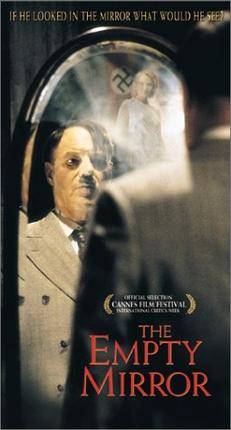Plot
The film is a fantastical journey through the looking-glass of history into the darkest recesses of the mind of Adolf Hitler. In a dreamlike subterranean environment removed from historical time, Adolf Hitler confronts the demons of his own psyche. As he dictates his memoirs, Hitler encounters apparitions of his confidant, Joseph Goebbels, his enigmatic mistress, Eva Braun, Hermann Göring, Sigmund Freud and the mysterious Woman in Black.
Through haunting images, Hitler's stream-of-consciousness soliloquies and exchanges with his phantom guests, The Empty Mirror presents a frightening primer on genius and psychosis, domination and destruction. The action unfolds amidst a streaming flow of archival film footage intercut with images from Leni Riefenstahl's masterpiece of Nazi propaganda, Triumph of the Will , as well as private home movies shot by Eva Braun.
Reception
Critical reaction to the film was generally favorable. Ella Taylor of The Atlantic Monthly called it an "ambitious, fascinating feature debut". [1] David Sterritt of The Christian Science Monitor said "it conjures up a postmodern version of what composer Richard Wagner called a Gesamtkunstwerk , or 'total art work'". [2] Ed Kelleher of Film Journal International called it "[a] vivid, unsettling… bold, demanding film…". [3] Also impressed, The Boston Phoenix reported, "in its silent moments of visual horror, many of them enduringly haunting, The Empty Mirror transcends its ambitious erudition, becoming a work of beauty and emotional depth". [4] On Norman Rodway as Hitler, Joe Leydon of MSNBC said, "Rodway – whose performance as Hitler is a canny balance of prideful fanaticism and anxious rationalization – is truly mesmerizing." [5] Similarly, Peter Stack of The San Francisco Chronicle remarked, "Rodway's bellowing, sometimes pleading tour-de-force is so extraordinary that it's almost scary to watch." [6] On a negative front, Lawrence Van Gelder of The New York Times , commented, "Adolf Hitler may have been many things, but it seems unlikely that he was the colossal bore portrayed in the hyperthyroid hodgepodge of pseudo-psychotherapy." [7] Left unimpressed, Kevin Thomas of The Los Angeles Times mused, "There's lots of flashy visuals as punctuation, but they simply serve to underline the theatricality of this entire endeavor, which belongs on a stage, if anywhere at all." [8]
This page is based on this
Wikipedia article Text is available under the
CC BY-SA 4.0 license; additional terms may apply.
Images, videos and audio are available under their respective licenses.
